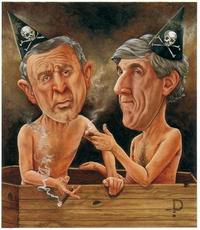| Blood Brothers | 2004-02-08 12:25 12 comments |
 by Flemming Funch by Flemming FunchVia Scarlet Jewels, George Bush & John Kerry: Blood Brothers from wing.tv. Yeah, good conspiracy stuff that shouldn't be forgotten. Particularly now it looks like it is John Kerry who's going to be best positioned to be the Democrat contender for Bush's job. Well, for starters, George Bush and John Kerry are both graduates of Yale University – that long-heralded bastion of the Eastern establishment. In addition, each of these men were members of Skull & Bones, the most exclusive secret society/fraternity in America, and prime breeding ground for the CIA and Council on Foreign Relations (CFR).Well, I don't think she picked exactly at random. Anyway, this is not all weird speculation of course. Well documented and confirmed that both John Kerry and the two George Bushes and a whole bunch of other folks in powerful positions are Skull and Bones members. Kerry is just as much an insider, or a little more, actually, which is worrisome. Means, essentially, that the same people would stay in power. Anyway, Bush was just interviewed for "Meet the Press" by Tim Russert, who did a rather fine job of bringing up the good questions. Which George W didn't have very good answers to. Like about deserting his National Guard duty. And he also managed to ask him about Skull and Bones. Transcript here. |